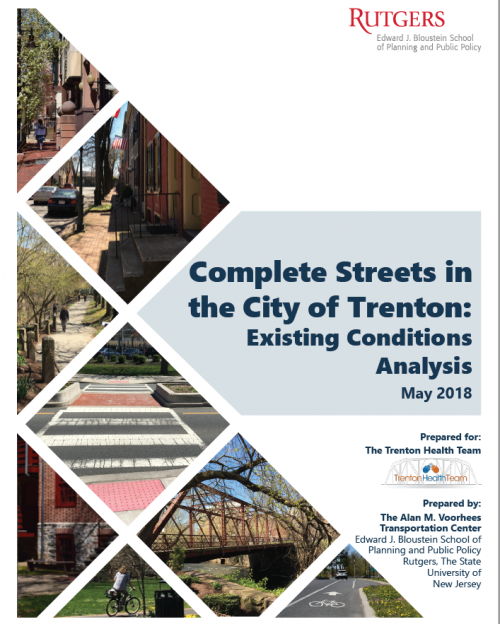The Trenton Health Team is an innovative partnership dedicated to improving health outcomes for the residents of Trenton, New Jersey. As part of their Transforming Communities Initiative, the Trenton Health Team is using evidence-based solutions to address the physical environment, economic revitalization, housing, and other social determinants of health. The Team has identified Complete Streets as a necessary intervention in order to achieve these goals.
Complete Streets are streets designed in a manner that allow everyone to use them in a safe and inclusive way. That means balancing the needs of pedestrians, bicyclists, motorists, transit, and freight, so that all users can reach their destination comfortably and safely. Complete Streets work as a health intervention because many roadways have previously been designed to only facilitate the movement of motor vehicles, hindering the use of active forms of transportation, such as walking and bicycling. By redesigning a corridor to welcome all users, residents are more likely to walk and bicycle. Aside from the immediate health benefits of a more active lifestyle, Trenton residents without access to a car will have increased access to medical services, social services, and healthy food once Complete Streets remove the barriers to walking and bicycling.
In order to implement Complete Streets in Trenton, the Trenton Health Team engaged the Voorhees Transportation Center (VTC) at Rutgers University to audit seven important transportation corridors. The purpose of this audit was to catalog the existing conditions that pedestrians, bicyclists, transit users, and motorists encounter every day. The seven corridors were selected after VTC compiled previous studies and existing information and presented the findings to stakeholders. The appendix of this report contains maps used in the selection of the corridors.
The corridors selected touch on every part of Trenton and offer convenient access to the Downtown District and across the city. The corridors are Brunswick Avenue, Calhoun Street, East State Street, Hamilton Avenue, North Olden Avenue, Pennington Avenue, and South Broad Street.
This report begins by reviewing the benefits of Complete Streets. It then takes a deep dive into the seven corridors. A map of each corridor provides an at-a-glance summary of the conditions of crosswalks and curb ramps. The text covers the findings from the audit on a block-by-block basis, reviewing the conditions of the sidewalks, the roadway, the intersections, the bus stops, and the comfort and appeal of each corridor. At the end of each section, there is a visual collection of common issues. These issues are also cataloged by exact address in the appendix. The report ends with general recommendations that address the most common issues found on each corridor. These recommendations take into account proven best practices in building Complete Streets.
Read full report: Complete Streets in the City of Trenton: Existing Conditions Analysis (2018)

